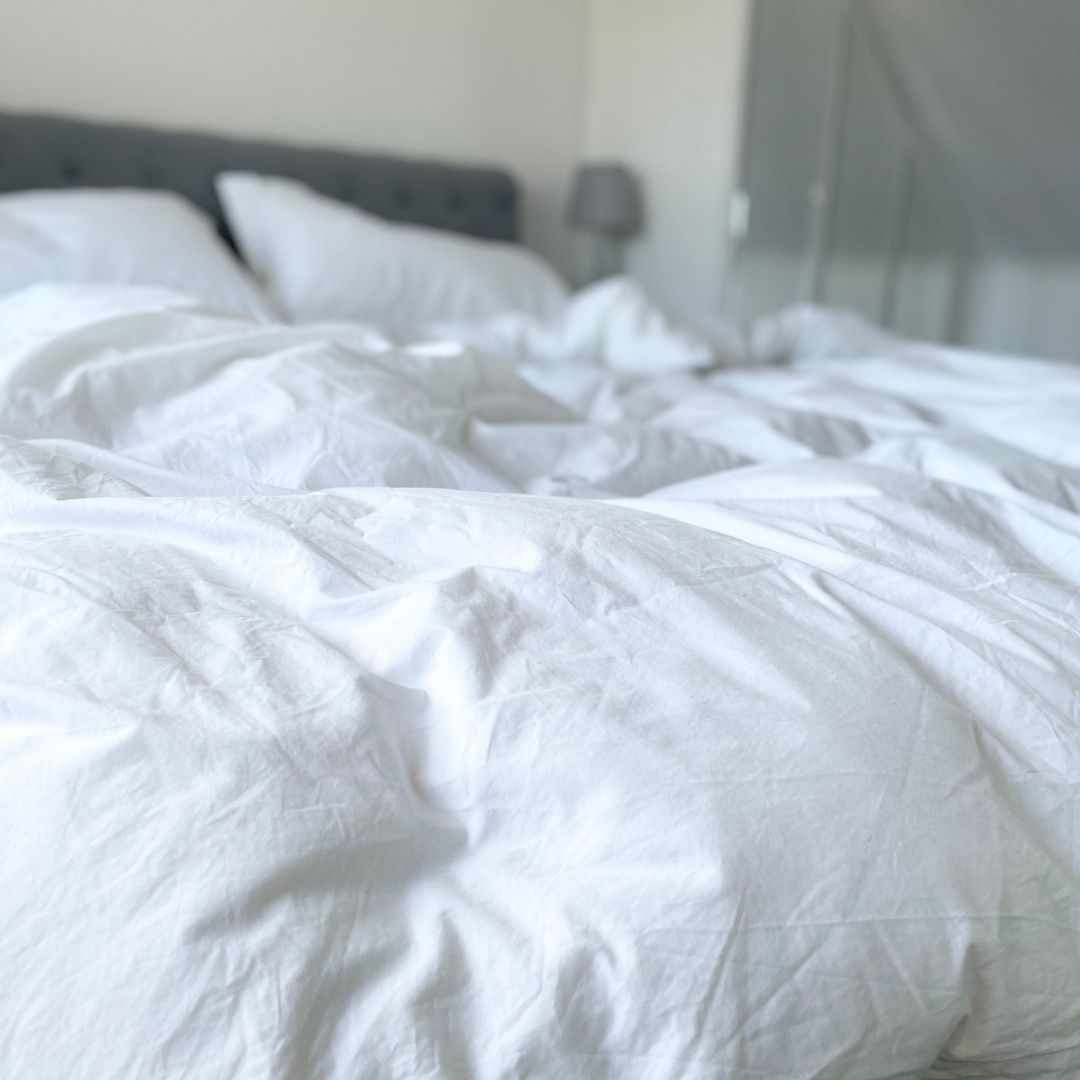How to Sleep Well, with 6 Simple Habits
May 12 , 2021
In an age of distraction and overstimulation, it’s hardly surprising that just under half of adults in the UK suffer with sleep issues. (https://thesleepcharity.org.uk) While sleep is thought of as a time of rest, the body is actually working hard to process memories and experiences from the previous day, repair cells and tissues, and to recharge energy reserves. That is no small feat! It is no wonder then that when we are deprived of good quality sleep, we begin to feel the effects in our waking state. Lack of sleep can impact many areas of our day-to-day health and wellness, including our ability to focus and concentrate, our mood, and even our hormone function. Sleep deprivation has been linked to increased levels of the hunger hormone, ghrelin, which has been shown to make overeating more likely, as well as the likelihood of choosing unhealthy foods. (We’ve all been there after a bad night, reaching for the caffeine + sugary carbs!) This can then create a vicious cycle, creating the conditions for another sleepless night. Not getting enough sleep has also been linked to an increased level of the stress hormone, cortisol. In other words, lack of sleep is a stressor, it puts internal stress on the body and limits the threshold for coping with added stress during the day.
For all of these reasons, and so many more, sleep really is a vital cornerstone to our overall wellbeing. So how can we start to create, or modify, daily habits that facilitate a restful night’s sleep, followed by happier and healthier days?
Maintain Your Sleep/Wake Cycle
We all have the occasional late night seeing friends, or lazy Sunday morning lay in. But trying to maintain a regular wake and sleep schedule for the majority of the time is a helpful way to harmonise your internal body clock. As our body anticipates sleep, it will begin to produce the sleep hormone, melatonin, which promotes feelings of sleepiness and the natural urge to rest. Going on the advice that 7-9 hours of sleep is optimal, depending on your individual needs, we suggest 10pm-6am as a good starting point, give or take an hour either side.
Morning Light Exposure
Getting some natural light exposure in the early part of the day is a small but significant way that you can impact your night’s sleep. All organisms have biological clocks to anticipate and respond to their environment, and humans are no different. Many of us feel the natural urge to wake with the burgeoning sunlight coming through our bedroom windows in the early morning, and the natural urge to slow down, take stock and unwind in the evening as the light fades. This is down to our internal body clock, and more specifically our circadian rhythm which is a daily cycle of roughly 24 hours dictated by day and night. Exposing ourselves to natural morning light can help to sync and optimise our circadian rhythm, and also helps to shake off any grogginess after waking.
Move Your Body
Moving your body during the day (and not too close to bedtime) has been shown to improve quantity and quality of sleep at night. Movement is also a great way to manage stress, as by using up the ‘fight or flight’ energy that the body accumulates through daily stressors, we reset the body’s stress response back to baseline and promote deeper relaxation later in the day. All movement is great, just make sure that you raise your heart rate a little and get a bit of a sweat on.
Skip the Caffeine Post-Lunchtime
Everyone metabolises caffeine differently, and while some of us are more sensitive to its effect than others, as a general rule it is best avoided after lunchtime. Caffeine is a stimulant and promotes the release of cortisol which, on top of the added cortisol from lack of sleep, can add to the viscous bad-sleep cycle.
Digest Before Bed
Everybody loves a late night snack, but the truth is that going to bed on a full stomach isn’t conducive to a good night’s sleep (boo!). On the other hand, going to bed hungry or thirsty has also been shown to disrupt sleep. So, it’s best to find a happy medium where you are satiated without being too full. Staying hydrated throughout the day, as well as eating wholefoods rich in good quality protein and healthy fats is a good general rule to follow. And for those midnight snackers, try avoiding sugar and simple carbohydrates, opting for satiating fats instead like nuts, nut butter, humous and edamame.
Turn Off Your Tech
Blue light emitted from our devices disrupts the body’s internal body clock, inhibiting the production of the sleep hormone, melatonin. This can lead to the feeling of being tired and wired, lying in bed but unable to fall asleep. Try to put your iPhone, laptop, or tablet away from 8pm. If you use your phone as an alarm, set your alarm in advance and then turn your phone on airplane mode, or ‘do not disturb’ mode, and put it away. This will prevent you from being tempted by any notifications, and you can decide the next morning when to make yourself digitally available.
We hope that these simple and manageable daily habits will help you to find a better night’s rest, and in turn a happier, healthier and more focused day!
We’d love to hear from you. Let us know your go-to sleep hacks or share your experiences below.
|
Rachel is one of the co-founders of The Wellness Philosophy, passionate about exploring different avenues towards wellness on all levels. As a 500hr trained yoga teacher, learning from highly respected teachers Claire Missingham, Anna Ashby and Jean Hall, Rachel’s expertise lies within the realm of yoga, mindfulness, meditation, and breathwork. Her practice has naturally inspired her to live in a way that honours her body, mind, and the natural world around her as best she can. From this, she will be exploring, researching, and sharing her own wellness findings with you all. Website: www.rachelskipper.com |
 |

